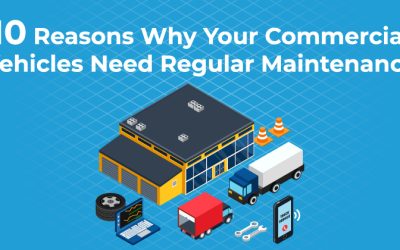
Maintaining a truck preventive maintenance schedule is essential for any commercial trucking business. Keeping a maintenance schedule in place helps ensure that your trucks are running at optimal performance and reduces the cost of repairs and unexpected breakdowns. Creating a preventive maintenance schedule that meets the needs of your business is not complicated, but it does require a bit of knowledge and planning.
This article will discuss the importance of preventive maintenance and what you need to consider when creating a truck preventive maintenance schedule. We’ll also provide tips for ensuring that your preventive maintenance schedule is adequate and up-to-date. You can keep your trucks running smoothly and safely for years with the right approach.
What is Truck Preventive Maintenance?
Preventive maintenance is a form of ongoing vehicle inspection intended to detect potential issues before they lead to costly repairs. Preventive maintenance can help extend your vehicle’s lifespan by addressing minor issues before they become more serious problems. Preventive maintenance differs from “breakdown maintenance” in that it focuses on minor issues that may not cause a breakdown but can reduce your vehicle’s efficiency and increase your operating costs.
Benefits of Preventive Maintenance
Any successful fleet is built on properly maintained vehicles. Regular maintenance prevents mechanical issues, which saves time, money, and headaches. But a proactive vehicle maintenance program offers even more benefits. Here are some significant advantages a robust plan will produce:
- Fewer unplanned downtimes
Less unplanned downtime due to equipment breakdown is achieved by scheduling regular and planned intervals to examine and maintain necessary equipment in top condition. You can keep your trucks on the road and earn money by addressing problems as soon as they arise. The need to reduce unplanned downtime and keep drivers on the road is more significant than ever as corporate expenses continue to rise.
- Improved fuel efficiency
Well-maintained vehicles have better engine performance, fuel efficiency, and reduced lifetime costs. Simple preventive measures like maintaining adequate tire pressure and clean oil filters over time notably affect performance and expenses.
- Boost safety
The goal of preventive maintenance is to identify possible problems before they arise. Regular maintenance inspections, such as ensuring the brakes and bearings are in good working order, prevent mechanical breakdowns that present safety threats to drivers, other road users, and workers on construction sites.
- Lower the cost of repairs
Preventive maintenance is one-way businesses may control or lower the expenses associated with equipment repair and maintenance, which can have an incredible impact on their bottom line. In addition to wasted driver time, reactive or unexpected maintenance can result in a significant amount of lost time spent responding to emergencies, troubleshooting equipment, or waiting for components. Preventive maintenance aims to lower these costs by boosting productivity and reducing expenses through routine planned maintenance.
- Enhance brand reputation
Someone is left in the lurch whenever your truck is unpredictably out of service owing to unforeseen repairs. Trust in your business starts to decline when this starts to happen frequently. You can keep your clients, employees, and other stakeholders happy by ensuring your fleet is constantly in excellent condition. Preventive care can help you establish a reputation for dependability, readiness, and polish.
- Extension of truck life
The best way to increase a truck’s lifespan is to regularly service it and steer clear of significant damage or excessive wear and tear. You can protect your fleet trucks’ investment and make the most of it through preventive maintenance. Maintaining a truck properly will cost less than replacing it every few years. Additionally, with regular maintenance, you can keep your fleet looking as fantastic as it does.
 Continuous Trip Inspections
Continuous Trip Inspections
Preventive maintenance should be considered part of everyday operations to avoid equipment problems and expenditures because managing a fleet requires carefully orchestrating several moving pieces daily.
Truck drivers are accountable for finishing pre-trip checks to ensure that vehicles are always in safe and appropriate operating conditions. Tires, fluids, electrical systems, and brakes are just a few of the things included in these daily car inspections. Pre-trip inspection checklists simplify handling concerns like brake failure and tire blowouts that could result in problems.
Seasonal Truck Maintenance
Weather fluctuations present particular difficulties for commercial vehicles in the summer and winter. According to the season or time of year, the following table provides some things to think about:
Since the cooling system will work more throughout the summer, maintenance focuses more on it when the weather is typically hot and dry. Additionally, changing tire pressure might result from heated air expanding, so paying extra attention to this area during the hotter months is advised.
Winter weather presents its own set of difficulties. Winter maintenance should concentrate on the parts of the vehicle susceptible to damage from severely cold temperatures, snow, and ice. Winter maintenance measures for diesel engines can increase the lifespan of various parts and systems. Given the potential for harsh driving conditions, winter maintenance operations should also include stocking rigs with vital safety equipment.
Preventive Maintenance Based on Mileage
In addition to being seasonal, maintenance planning can also be time-based or usage-based. The frequency and scheduling of preventive maintenance chores will be primarily determined by individual fleet vehicles and their usage patterns.
The chart below provides a basic overview of the suggested maintenance intervals for commercial trucks based on typical, heavy-duty operation and any potential pre-trip inspection coverage.
Conclusion
Creating a truck preventive maintenance schedule can be challenging, but it is essential for any commercial trucking business. By taking the time to consider the needs of your trucks and the types of maintenance they require, you can create a schedule that will keep your trucks running smoothly and safely for years to come.
Our engineers can assess your equipment and recommend the most efficient and cost-effective maintenance program. We offer preventive maintenance services, such as calibration, PM inspections, and repairs. We also provide equipment installation and replacement. With TMS-Digital’s Equipment Maintenance, you benefit from expert engineering and fast, reliable service. Reduce costs and improve reliability with equipment maintenance from TMS-Digital.
Contact us today to schedule a demo.









